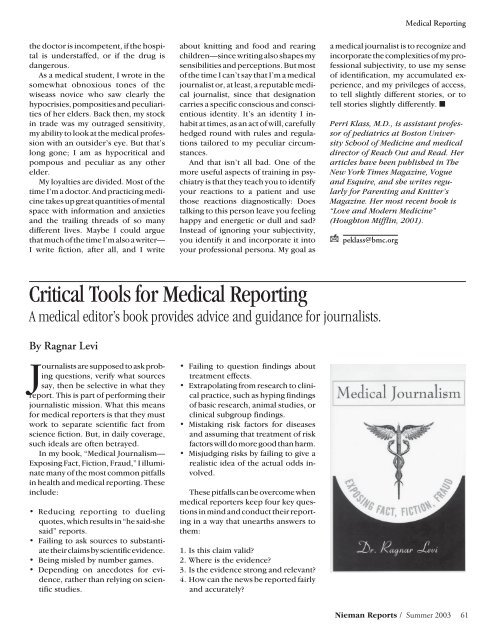summer-2003-Part 2-live - Nieman Foundation - Harvard University
summer-2003-Part 2-live - Nieman Foundation - Harvard University
summer-2003-Part 2-live - Nieman Foundation - Harvard University
- No tags were found...
You also want an ePaper? Increase the reach of your titles
YUMPU automatically turns print PDFs into web optimized ePapers that Google loves.
Medical Reportingthe doctor is incompetent, if the hospitalis understaffed, or if the drug isdangerous.As a medical student, I wrote in thesomewhat obnoxious tones of thewiseass novice who saw clearly thehypocrisies, pomposities and peculiaritiesof her elders. Back then, my stockin trade was my outraged sensitivity,my ability to look at the medical professionwith an outsider’s eye. But that’slong gone; I am as hypocritical andpompous and peculiar as any otherelder.My loyalties are divided. Most of thetime I’m a doctor. And practicing medicinetakes up great quantities of mentalspace with information and anxietiesand the trailing threads of so manydifferent <strong>live</strong>s. Maybe I could arguethat much of the time I’m also a writer—I write fiction, after all, and I writeabout knitting and food and rearingchildren—since writing also shapes mysensibilities and perceptions. But mostof the time I can’t say that I’m a medicaljournalist or, at least, a reputable medicaljournalist, since that designationcarries a specific conscious and conscientiousidentity. It’s an identity I inhabitat times, as an act of will, carefullyhedged round with rules and regulationstailored to my peculiar circumstances.And that isn’t all bad. One of themore useful aspects of training in psychiatryis that they teach you to identifyyour reactions to a patient and usethose reactions diagnostically: Doestalking to this person leave you feelinghappy and energetic or dull and sad?Instead of ignoring your subjectivity,you identify it and incorporate it intoyour professional persona. My goal asa medical journalist is to recognize andincorporate the complexities of my professionalsubjectivity, to use my senseof identification, my accumulated experience,and my privileges of access,to tell slightly different stories, or totell stories slightly differently. ■Perri Klass, M.D., is assistant professorof pediatrics at Boston <strong>University</strong>School of Medicine and medicaldirector of Reach Out and Read. Herarticles have been published in TheNew York Times Magazine, Vogueand Esquire, and she writes regularlyfor Parenting and Knitter’sMagazine. Her most recent book is“Love and Modern Medicine”(Houghton Mifflin, 2001).peklass@bmc.orgCritical Tools for Medical ReportingA medical editor’s book provides advice and guidance for journalists.By Ragnar LeviJournalists are supposed to ask probingquestions, verify what sourcessay, then be selective in what theyreport. This is part of performing theirjournalistic mission. What this meansfor medical reporters is that they mustwork to separate scientific fact fromscience fiction. But, in daily coverage,such ideals are often betrayed.In my book, “Medical Journalism—Exposing Fact, Fiction, Fraud,” I illuminatemany of the most common pitfallsin health and medical reporting. Theseinclude:• Reducing reporting to duelingquotes, which results in “he said-shesaid” reports.• Failing to ask sources to substantiatetheir claims by scientific evidence.• Being misled by number games.• Depending on anecdotes for evidence,rather than relying on scientificstudies.• Failing to question findings abouttreatment effects.• Extrapolating from research to clinicalpractice, such as hyping findingsof basic research, animal studies, orclinical subgroup findings.• Mistaking risk factors for diseasesand assuming that treatment of riskfactors will do more good than harm.• Misjudging risks by failing to give arealistic idea of the actual odds involved.These pitfalls can be overcome whenmedical reporters keep four key questionsin mind and conduct their reportingin a way that unearths answers tothem:1. Is this claim valid?2. Where is the evidence?3. Is the evidence strong and relevant?4. How can the news be reported fairlyand accurately?<strong>Nieman</strong> Reports / Summer <strong>2003</strong> 61
















